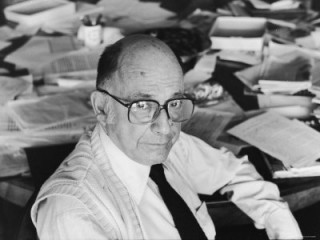
Abe Burrows biography
Date of birth : 1910-12-18
Date of death : 1985-05-17
Birthplace : New York City, New York, U.S.
Nationality : American
Category : Famous Figures
Last modified : 2011-08-14
Credited as : Author and humorist, radio director, playwright
0 votes so far
His radio career gained strength when he collaborated with Ed Gardner, the writer and star of radio legend Duffy's Tavern. The two created the successful series after Gardner's character, Archie, premiered on the earlier radio program, This Is New York. Burrows was made the show's head writer in 1941, and he credited the experience with investing the Runyonesque street characters he fashioned for Guys and Dolls. "The people on that show," Burrows once said about Duffy's Tavern, "were New York mugs, nice mugs, sweet mugs, and like (Damon) Runyon's mugs they all talked like ladies and gentlemen. That's how we treated the characters in Guys and Dolls."
Burrows also wrote for Danny Kaye's short-lived mid-1940s radio comedy show, helping head writer Goodman Ace fashion material for Kaye and co-stars Eve Arden and Lionel Stander. He quit Duffy's Tavern in 1945 to work at Paramount Pictures but soon returned to radio. As a guest on Here's Morgan in 1947, Burrows performed "I'll Bet You're Sorry Now, Tokyo Rose, Sorry for What You Done."
Meanwhile, he became a popular guest on the Hollywood party circuit, performing his own satirical songs ("Darling Why Shouldn't You Look Well Fed, ‘ Cause You Ate Up a Hunka My Heart?" and "The Girl with the Three Blue Eyes"). Such informal performances led to a nightclub act and regular appearances as a performer on CBS radio programs, eventually hosting his own radio program, The Abe Burrows Show (CBS) in 1948, a 15-minute weekly comedy Burrows wrote and directed as well. As he recalled years later, his show came about while he was scripting a radio show for Joan Davis when George Jessel asked him, "When the hell are you gonna become a professional?" Burrows continued as Davis' head writer while doing his own show.
Mixing comic patter ("I guess I could tell you exactly what I look like, but I think that's a lousy thing to say about a guy") with his clever comic songs, The Abe Burrows Show was popular with listeners and critics but not with its sponsor, Lambert Pharmaceutical, then the makers of Listerine mouthwash but promoting a Listerine toothpaste on the show.
Both of Burrows' radio shows originated from CBS's Los Angeles affiliate, KNX, whose program director Ernie Martin encouraged Burrows—who had done some film work—to think about writing plays. "I told him I felt my funny stuff was okay for radio, but I didn't think people would pay theater prices to hear it," Burrows recalled.
Burrows credited his success in the theatre to his work under the theatre legend George S. Kaufman. In the Kaufman biography by Howard Teichmann, Burrows is quoted as saying that what he said (as a director, to his cast), was what he heard Kaufman say in their collaboration on Guys and Dolls.
Burrows also wrote the screenplay for the 1956 film, The Solid Gold Cadillac, as well as producing a pair of television series, Abe Burrows' Almanac (1950) and The Big Party (1959).
In 1980, Burrows published his memoir, Honest, Abe: Is There Really No Business Like Show Business?, in which he recalled the meat of his career, including his mentoring of several comedy writers including future M*A*S*H writer Larry Gelbart (who was once a Duffy's Tavern writer), Nat Hiken, Dick Martin and Woody Allen, the latter a distant cousin of Burrows'.
Author of books:
Honest, Abe: Is There Really No Business Like Show Business? (1980, memoir)
Wrote plays:
Guys and Dolls (1950)
Three Wishes for Jamie (1952)
Can-Can (1953)
Silk Stockings (1955)
Say, Darling (1958)
First Impressions (1959)
How to Succeed in Business Without Really Trying (1961)
Cactus Flower (1965)
Four on a Garden (1971)
Hellzapoppin (1976)
















